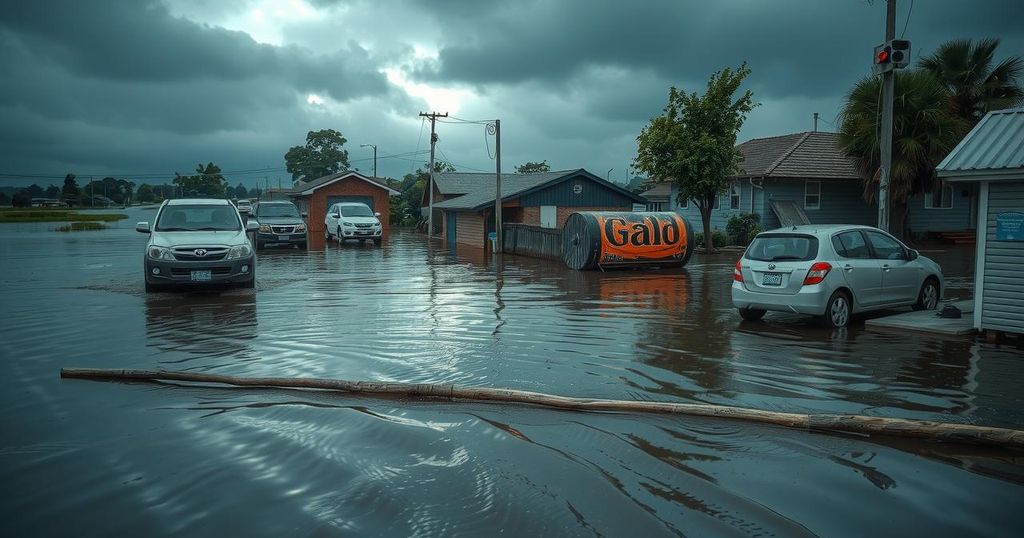Climate Change Intensifies Flooding Crisis Across Africa

In the past twelve rainy seasons, flooding caused by a rising Niger River has repeatedly devastated homes in Lokoja, Nigeria. Climate change has intensified flooding across Africa, affecting millions and jeopardizing food security. The consequences of these extreme weather events necessitate urgent climate action to address their root causes and reduce their impacts on vulnerable communities.
Over the past twelve rainy seasons, 67-year-old Idris Egbunu has repeatedly experienced the devastating impact of flooding in central Nigeria, as the Niger River overflows and inundates his home for weeks at a time. Each time, he is forced to return to a property that necessitates extensive cleaning, repairs, and repainting—until the cycle begins anew. This scenario is commonplace in Lokoja, Kogi State, where climate change has significantly altered weather patterns and increased the severity of flooding across vast regions of Africa. In recent years, the torrential rains have impacted approximately 6.9 million individuals in West and Central Africa as of early 2024, according to the United Nations Office for the Coordination of Humanitarian Affairs (OCHA). While residents claim that floods in Kogi State became notably worse in 2012, the situation escalated dramatically in 2022 when Nigeria experienced its most severe flooding in a decade, resulting in over 500 fatalities and displacing 1.4 million people. Emergency agency advisor Sandra Musa expressed concerns regarding the current situation, stating that although this year has not yet reached the extremes of 2022, it is indeed “very, very bad.” Throughout the region, countless families face ruin as their homes and crops are washed away, threatening local food security. Fatima Bilyaminu, a local shopkeeper, described her plight, indicating that she must navigate floodwaters just to access her home, which is nearly submerged. The economic toll of such events is exacerbated by the fact that many individuals, like Mrs. Bilyaminu, lack the financial means to relocate or adequately repair their homes. The ramifications of climate change continue to intensify across the continent, which accounts for a mere four percent of global greenhouse gas emissions. Aida Diongue-Niang of the UN’s Intergovernmental Panel on Climate Change (IPCC) noted the unusual patterns of rainfall and extreme weather events this year, including unprecedented rainfall distribution in the Sahel region and significant rain increases in Niger. The destruction caused extends beyond Nigeria, as neighboring Chad has reported over 576 deaths and 1.9 million individuals affected by flooding, while Cameroon has seen more than 56,000 homes inundated. Researchers warn that the frequency and intensity of extreme weather events in Africa are projected to escalate as global temperatures rise. Clair Barnes from Imperial College London asserted, “It used to be a decadal cycle of flooding, and we’re now into a yearly cycle,” emphasizing that unless fossil fuels are phased out, the crisis will only exacerbate. Youssouf Sane of Senegal’s meteorology agency cautioned that urban development near riverbanks increases susceptibility to flooding and urged governments to regard the nexus of climate change and urbanization. In order to address these challenges effectively, Diongue-Niang indicated the necessity of reducing greenhouse gas emissions—not only a responsibility for the affected regions but for the entire global community.
Climate change continues to inflict severe impacts on various regions of Africa, heightening the risk of flooding and adversely affecting millions of lives. As rainfall patterns fluctuate and intensify, flooding occurrences have become more frequent, exerting immense pressure on local infrastructure and food security. The implications of these extreme weather events reflect broader issues related to urban planning, environmental governance, and the urgent need for climate action from global stakeholders.
In summary, Africa is facing unprecedented challenges due to climate change, as evidenced by the increasing prevalence and severity of flooding across the continent. Local communities are experiencing devastating damage to homes and livelihoods, with millions being affected. Urgent action is required to mitigate greenhouse gas emissions, improve urban planning, and enhance resilience against extreme weather phenomena to protect vulnerable populations in the future.
Original Source: phys.org






